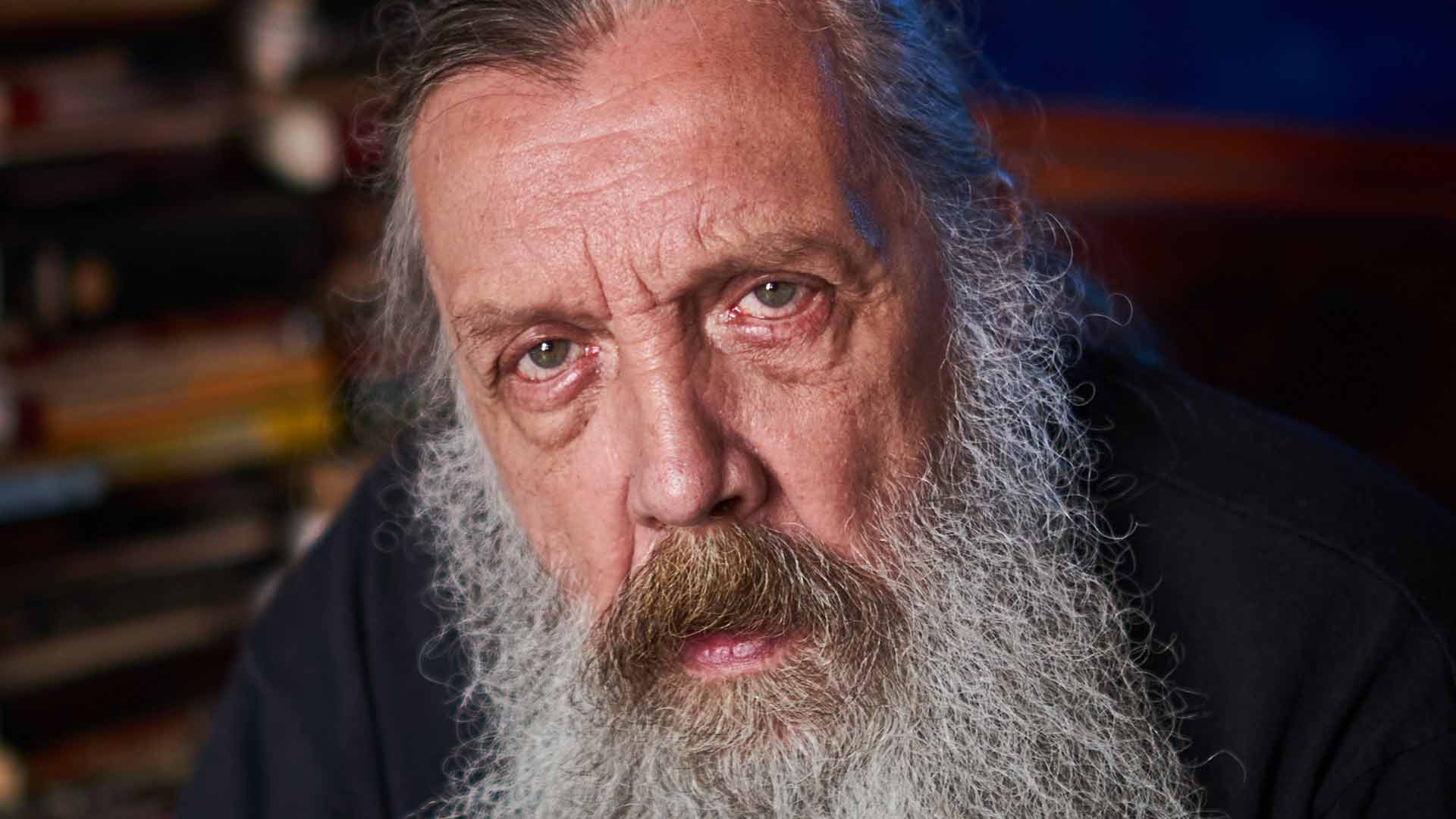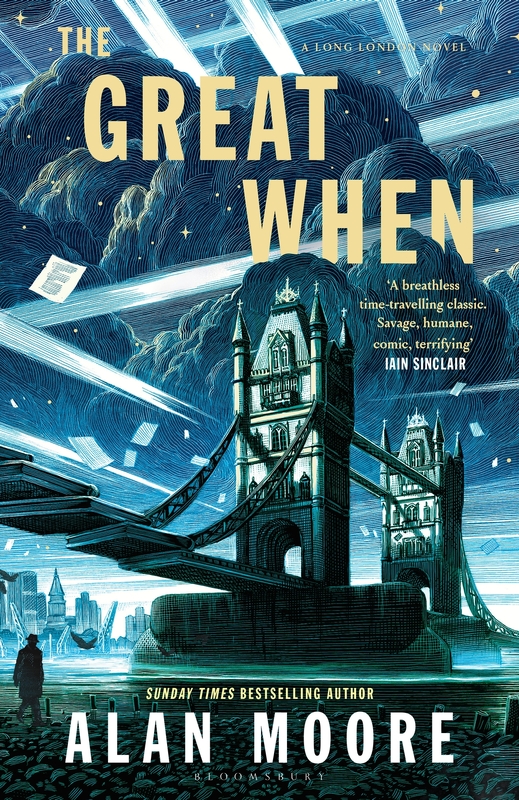You are viewing your 1 free article this month. Login to read more articles.
Pioneering writer Alan Moore introduces his new fantasy series set between 1940s London and its otherworldly counterpart
Alan Moore’s new novel, The Great When, is historical fantasy at its very best
It is seven o’clock in the evening, on the hottest day of the year, when I speak over the phone to the illustrious Alan Moore, who is at his home in Northampton. His magisterial new fantasy novel, The Great When, is the first in the Long London quintet that offers an encompassing and idiosyncratic portrait of the English capital.
Moore is regarded as one of the best writers of comics in the English language. His pioneering oeuvre includes Watchmen, V for Vendetta, Miracleman and From Hell, but he has now formally retired from comics and turned his pen to prose. Moore’s first two novels, Voice of the Fire and the magnum opus Jerusalem, both explore his hometown of Northampton. They were followed by Illuminations, a short-story collection that includes a novella-length tale about the history of the comic industry. In total, nearly one million copies of Moore’s work, across all editions, have sold through Nielsen BookScan.
The Great When departs from Moore’s beloved Northampton—the “obvious centre of the universe”—and settles in London in 1949, when the city and its populace are physically and psychologically “in pieces”. This precarity provides a fertile backdrop for the misadventures of the novel’s protagonist, the hapless Dennis Knuckleyard, a motherless 18-year-old living and working with the profoundly grotesque bookshop owner, Coffin Ada.
Dennis is enduring his rather dreary life until he accidentally comes into possession of a book—a book that should not exist in this world. Thrown out by Coffin Ada, poor Dennis is left to return the tome, but circumstances conspire against him. With the former owner of the book now dead, Dennis finds himself the target of a criminal gang who want the mysterious text. Homeless and on the run, Dennis inadvertently stumbles into the “other London”. Also known as the “Great When” or “Long London”, this nightmarish, imaginary realm is the supernatural counterpart to the city Dennis calls home. It is a place where you can converse with the preserved decapitated head of Thomas Cromwell and one wrong step can result in death. Dennis must not only learn how to navigate this new realm, and the criminals, artists and occult figures with which he is now entwined, but also completely reconfigure his understanding of reality.
I’m making more of an effort to conjure this spell of words to involve the readers, to make them feel like they are viscerally there
This is no Narnia-esque tale where entry into the magical realm is preceded by the tickle of fur coats and the smell of pine. Dennis’ introduction to the Great When is visceral and violent. Upon arrival, he is immediately confronted with “anaconda drainpipes that detach from walls” and “chewing-gum molluscs inching to investigate his edibility”. Moore explains: “I thought if we were to enter Narnia, or any of these other places, it would surely be a much bigger deal. It would be so jarring. It would probably undo us mentally and traumatise us for the rest of our lives.” After his first foray into the other city, Dennis immediately bursts into tears and later expeditions are marked with varying bodily functions. “This is something that would jar with every idea of reality that you’ve ever formulated. Your entire sense of what is real and what isn’t would have been shattered.”
Moore is a magician and thus no stranger to reality-altering experiences. He is not a performer, but rather a man who sees the world differently, steeped in the idea that the imaginary realm is as real as the one we are currently inhabiting. “My entry into magic and Dennis’ entry into Long London do have some similarities in that they both happened unexpectedly by accident, and both happened in London,” he tells me. However, this is where the similarities end; Moore, “rather than falling back on the vast number of things that are to be found in books on magic” and those ceremonial rituals of which he is familiar, wanted to “make up new things” and bring new magic to The Great When.
The novel is a representation of Moore’s “preoccupation” with the “semi-permeable membrane between fact and fiction”, which is the belief that “everything in the physical world somehow emerges through the world of fiction and imagination”. The “other London” is the imaginary foundation that underpins the material reality of the city, and the boundary between the two is incredibly porous. Described in the novel as the “‘hidden attic of mankind’s imagination’”, anything that happens in the Great When will inevitably “percolate through to our world”. Moore adds: “My ultimate conclusion is that if the physical world actually comes from this intangible imaginary fictional world, then you’d have to say that the fictional world is, in some sense, the truer world.” The only way into the “real Great When” he adds, rather conspiratorially, is through “the doorways of the imagination, if you’ve got the strength to push them open far enough”.
Melding historical and geographical accuracy with the fantastical was “one of the most strenuous things in writing the book”. By bringing together fact and fiction, Moore set out to re-enchant London, to create a portrait of the metropolis that not only captures the physical nature of the city, but its essence. “We conjure an imaginary London that is at least half fiction,” says Moore. “We associate the characters of Dickens, say, with our picture of 19th-century London. It is, for us, a conglomerate of its past, present, future, fiction and mythology. I wanted to somehow condense all those things into a bouillon, a kind of boiled down essence or soup, of the entirety of the city.”
It is not an easy task, but Moore executes it exquisitely in prose that burns with fierce intelligence and wit. His idiosyncratic use of language, with modernist gestures, is a marvel that tasks the reader to keep pace with his kaleidoscopic imagination. Now 70 years old, Moore is “making more of an effort to conjure this spell of words to involve the readers, to make them feel like they are viscerally there, like these things are actually happening to them in a vicarious sense”. But he expects the same effort in return: “I’m depending upon readers to do at least part of the work, because I think that the more work they do, the more they will enjoy it.”
The Great When is fantasy at its very best, a possible future classic. After reading the novel, readers will seek gateways to the other London, into the realm of the imagination that exists at the very edges of our comprehension. As usual, Moore says it best: “I once heard a great definition of ‘to haunt’: We are haunted by that which we do not, or do not completely, understand.”












